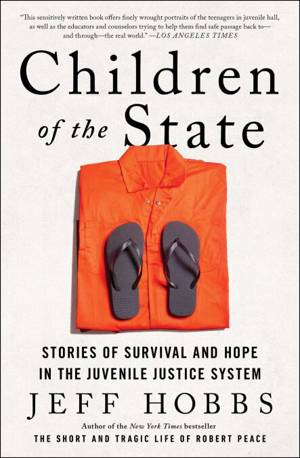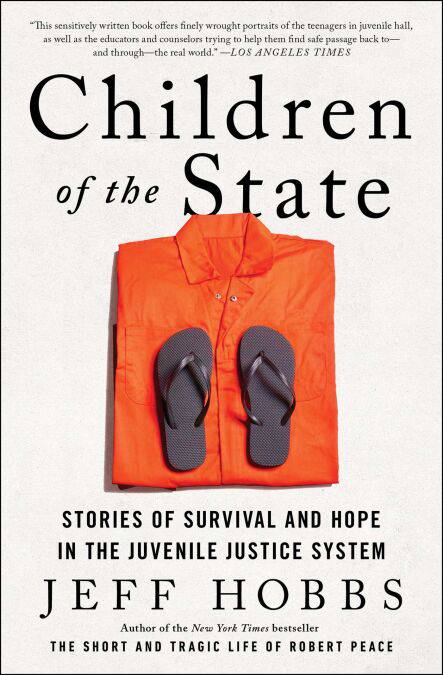
- Retrait gratuit dans votre magasin Club
- 7.000.000 titres dans notre catalogue
- Payer en toute sécurité
- Toujours un magasin près de chez vous
- Retrait gratuit dans votre magasin Club
- 7.000.0000 titres dans notre catalogue
- Payer en toute sécurité
- Toujours un magasin près de chez vous
Children of the State EBOOK
Stories of Survival and Hope in the Juvenile Justice System
Jeff Hobbs
Ebook | Anglais
16,76 €
+ 16 points
Format
Description
From the bestselling and critically acclaimed author of The Short and Tragic Life of Robert Peace comes “an eye-opening, fully humanizing, deeply affecting look at the often-misunderstood juvenile justice system and its inhabitants—young people of earnestness, disappointment, hope, and resilience” (Booklist, starred review).
For many kids, a mistake made at age thirteen or fourteen—often resulting from external factors coupled with a biologically immature brain—can resonate through the rest of their lives, making high school difficult, college nearly impossible, and a middle-class life a mere fantasy. In Children of the State, Jeff Hobbs challenges any preconceived perceptions about how the juvenile justice system works—and demonstrates in brilliant, piercing prose: No one so young should ever be considered irredeemable.
Writing with great heart and sensitivity, Hobbs “offers finely wrought portraits of the teenagers in juvenile hall, as well as the educators and counselors trying to help them find safe passage back to—and through—the real world” (Los Angeles Times). While serving a year-long detention in Wilmington, Delaware, a bright young man considers both the benefits and the immense costs of striving for college acceptance while imprisoned. A career juvenile hall English Language Arts teacher struggles to align the small moments of wonder in her work alongside its statistical futility. A territorial fistfight in Paterson, New Jersey, is called a hate crime by the media and the boy held accountable seeks redemption and friendship in a demanding Life & Professional Skills class in lower Manhattan. Through these stories, Hobbs creates intimate portraits of these individuals as they struggle to make good decisions amidst the challenges of overcoming their pasts, and also asks: What should society do with young people who have made terrible mistakes?
“At turns touching and intimate, enraging and honest” (Matthew Desmond), Children of the State masterfully blends personal stories with larger questions about race, class, prison reform, justice, and even about the concept of “fate.”
For many kids, a mistake made at age thirteen or fourteen—often resulting from external factors coupled with a biologically immature brain—can resonate through the rest of their lives, making high school difficult, college nearly impossible, and a middle-class life a mere fantasy. In Children of the State, Jeff Hobbs challenges any preconceived perceptions about how the juvenile justice system works—and demonstrates in brilliant, piercing prose: No one so young should ever be considered irredeemable.
Writing with great heart and sensitivity, Hobbs “offers finely wrought portraits of the teenagers in juvenile hall, as well as the educators and counselors trying to help them find safe passage back to—and through—the real world” (Los Angeles Times). While serving a year-long detention in Wilmington, Delaware, a bright young man considers both the benefits and the immense costs of striving for college acceptance while imprisoned. A career juvenile hall English Language Arts teacher struggles to align the small moments of wonder in her work alongside its statistical futility. A territorial fistfight in Paterson, New Jersey, is called a hate crime by the media and the boy held accountable seeks redemption and friendship in a demanding Life & Professional Skills class in lower Manhattan. Through these stories, Hobbs creates intimate portraits of these individuals as they struggle to make good decisions amidst the challenges of overcoming their pasts, and also asks: What should society do with young people who have made terrible mistakes?
“At turns touching and intimate, enraging and honest” (Matthew Desmond), Children of the State masterfully blends personal stories with larger questions about race, class, prison reform, justice, and even about the concept of “fate.”
Spécifications
Parties prenantes
- Auteur(s) :
- Editeur:
Contenu
- Nombre de pages :
- 384
- Langue:
- Anglais
Caractéristiques
- EAN:
- 9781982116385
- Date de parution :
- 23-01-23
- Format:
- Ebook
- Protection digitale:
- Adobe DRM
- Format numérique:
- ePub

Les avis
Nous publions uniquement les avis qui respectent les conditions requises. Consultez nos conditions pour les avis.






